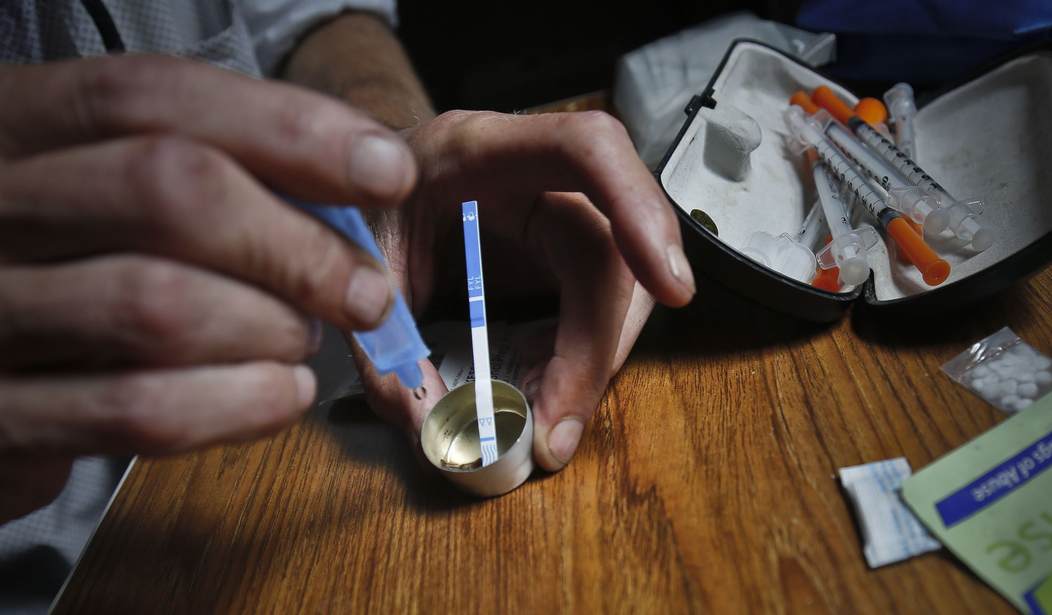An absolutely gutting statistic on its face, which also plays into other flashpoint issues facing the country – including the COVID pandemic and the ongoing border crisis. We'll address both of those points below, but no matter how you analyze or slice it, this "top line" number – which offers partial quantification of suffering and addiction in our country – is just heartbreaking and appalling:
More than 100,000 people died from drug overdoses in a 12-month period for the first time, a majority of which were fueled by the potent drug fentanyl https://t.co/98cg2nanLk
— michaelscherer (@michaelscherer) November 17, 2021
NEW YORK (AP) - An estimated 100,000 Americans died of drug overdoses in one year, a never-before-seen milestone that health officials say is tied to the COVID-19 pandemic and a more dangerous drug supply.
— Ed O'Keefe (@edokeefe) November 17, 2021
More than 100,000 Americans died of drug overdoses during the 12 months following the COVID-19 lockdowns, the most overdose deaths ever recorded in a one-year span, according to the Centers for Disease Control and Prevention. The CDC's National Center for Health Statistics estimates released Wednesday show 100,306 drug overdose deaths during 12 months ending in April. That represents a jump of 28.5% from the 78,056 deaths during the same period one year before, and is more than double the number of deaths each year from vehicle crashes. The provisional data, which includes cases still under investigation, provides the first full picture of the impact of stay-at-home orders many states implemented mid- to late March 2020 to limit spread of the coronavirus. Although states began to ease restriction weeks or months later, some people in recovery struggled to maintain sobriety, while others turned to drugs to cope.
Recommended
So of course this is "tied to" the pandemic. Addiction and overdose issues were absolutely a prevalent problem before COVID, but the new crisis pushed the existing crisis into hyperdrive. I believe that our elites have not even begun to grapple with the negative, ripple-effect consequences of many COVID mitigation strategies, including lockdowns and systemic isolation. This applies across the board, very much including massive disruptions for children, delayed medical care or detection for various serious conditions, domestic violence flare-ups, and drug or alcohol abuse issues. We may never have a perfect understanding of the trade-offs' impacts, but policymakers must acknowledge that there were serious trade-offs – a reality that has far too often been downplayed or outright denied. A one-year explosion of drug overdosed deaths is one way to partially quantify that reality. Some of those should be considered another form of COVID deaths.
The mention of fentanyl is also significant. The influx of this deadly drug into the United States has been exacerbated by the Biden border crisis, under which strained American resources have been directed toward huge logistical hurdles involving alleged asylum seekers. With personnel and resources devoted elsewhere, cartels and traffickers have taken full advantage, funneling dangerous people, drugs, and weapons into the country. And that's contributing to American deaths. This was an NBC report published a few months ago:
Federal agents in this section of the southern border say they’ve seen a staggering 4,000 percent increase in fentanyl seizures over the last three years. Those busts are not at ports of entry, where most smuggled drugs are typically found. The Border Patrol says the rising amount of fentanyl is being found in the desert – transported by increasingly brazen smugglers who are exploiting stretched federal resources. In 2018, the Border Patrol in the El Paso sector found just one pound of fentanyl outside ports of entry. In 2019, two pounds. In 2020, nine.
This comes as border apprehensions last month dropped slightly over September, but still spiked to an all-time October high (based on stats on record):
October apprehensions at the southern border have more than DOUBLED compared to last October.
— America Rising (@AmericaRising) November 16, 2021
The data released by CPB shows just how poorly the Biden Administration has handled border security since taking office. https://t.co/aN0Im51aCn
We don't yet know how many "got aways" entered the country illegally in last month, which have been estimated to be in the tens of thousands every month. This isn't just a humanitarian problem. It's a national security problem. And it's a public health problem, given both COVID and the drugs disaster. I'll leave you with Biden's DHS Secretary sounding very pleased with this administration's performance at the border:
“Do you believe that the Biden immigration policies are successful?”
— RNC Research (@RNCResearch) November 16, 2021
MAYORKAS: “We’re on the road to success”
“How would you grade yourself?”
MAYORKAS: “I give myself an A” pic.twitter.com/quM4SCC0lA
More than 1.6 million illegal immigrants were apprehended at the border in the last year, plus hundreds of thousands of "got aways." A-level work, says Mayorkas.

























Join the conversation as a VIP Member